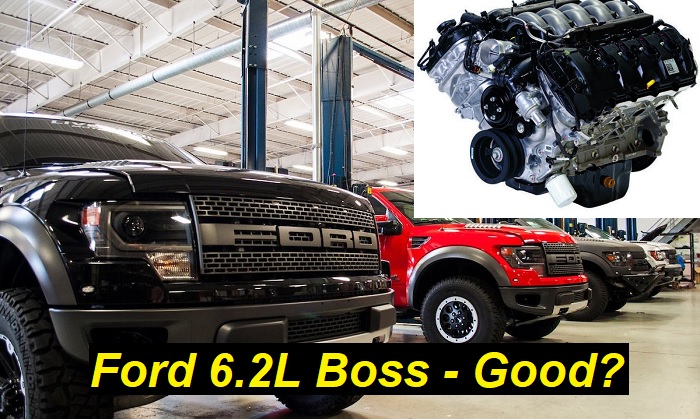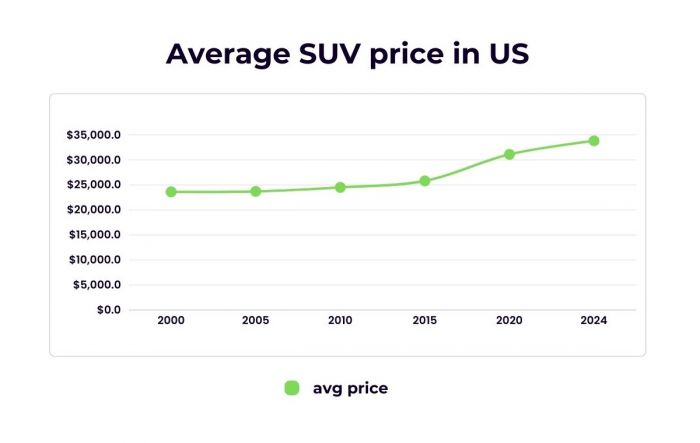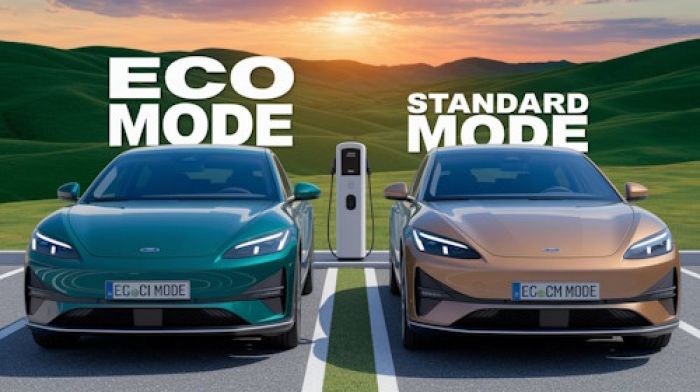Big engines are something we will miss in some years. Nearly all manufacturers have already completed their downsizing policy and have introduced new generations of small-displacement engines with huge turbochargers and tiny lifespans. But some engines are still on the go and can remain reliable for years to go.
We are talking about wonderful Ford engines that have over 5 liters of displacement. And one of these engines is Ford 6.2L Boss. The company started offering this powerplant in 2010 and it's still in production. It's a great V8 engine that has only one obvious disadvantage compared to new tiny turbocharged units - it's not at all economical.
By the way, the estimated life expectancy of the 6.2L Boss engine is up to 400,000 miles. On average, it may last longer but will require some investments.

Key features and my opinion about the engine
- Production years:2010-2022
- Average lifespan of Boss:350,000-400,000 miles
- Fuel supply type:port injection
- Power range:385-500 hp
- Fuel efficiency:awful
- Engine block material:cast-iron
- Engine reliability score:high
- The most common problems:heavy oil consumption, water pump problem, complicated spark plug replacement, enormous fuel consumption.
Ford 6.2 Boss engine - what are its main specs?
The engine is marvelous in terms of construction. Its big capacity allowed the manufacturer to forget about those ultra-modern things for head construction and rely on a very simple classical construction that is reliable, long-lasting, and problem-free. The 6.2L Boss engine is a simple unit that will not let you down.
Ford invented the Boss engine to compete with Hemi engines by Chrysler and also with Vortec engines by GM. We can't say for sure that Ford engines are much better than any competitors on the market, but they are still very good. These are big-displacement engines and they have a lot of advantages over their counterparts.
We should only shortly show you some specs of the 6.2L Boss:
- it's a V8 naturally aspirated engine;
- the displacement of 6.2 liters is completely enough for its tasks;
- the engine has been offered in many versions with power from 385 to 500 hp;
- the torque range is 405-477 lb-ft;
- SOHC valvetrain with 2 valves per cylinder is as simple as a bicycle;
- port fuel injection is a big win for this engine compared to many of its counterparts;
- variable cam timing is probably the only thing that hints that the engine is modern.
Someone will say that the 6.2L Boss engine is old-fashioned and not efficient. But think of its durability, simple and cheap maintenance, and also other pros. This is the best option when you are choosing a vehicle that is going to work hard for your business or for other needs. Yes, it's still a bad choice for a simple vehicle that you are going to drive to a supermarket.
The efficiency is a very hard question. The Ford 6.2 Boss engine will offer 15 mpg on the highway and only 12 mpg in the city (or even less). But it's actually not that bad and you should pay attention to the good sides of the engine.
What vehicles have been powered by the 6.2L Boss engine?
1) Ford F-150 trucks
Many trims of the F-150 have been powered by this engine. Unfortunately, we see the tendency of EcoBoost engines to take over this model because they are more powerful and offer better gas mileage.
2) Ford F-Series commercial and heavy-duty trucks
Companies and organizations love this engine because it doesn't get on their nerves with a lot of minor problems. It's a reliable option and you can drive the vehicle powered by this engine for a lot of miles.
3) Ford E-Series vans
For a van, the 6.2L Boss engine is really good because it offers wonderful power and torque and comparably good gas mileage on the highway. So, it's not a bad option if you are choosing a reliable van for business or for your family.
4) Crate engine
Yes, you can buy the Ford Boss engine as a crate engine. You will probably pay around $5,000 to buy one. But it will be a good choice for a project car. Also, these engines can easily be tuned and turbocharged.
What's the life expectancy of the Ford 6.2 Boss engine?
The longevity of the Boss engine is hard to estimate. But we can say for sure that the engine is very durable. Some units have been known to hit the 1,000,000-mile mark with only some minor repairs.
Most experts agree that the 6.2L Boss engine can approximately go 400,000 miles or more. Then you may repair it and it will go another 200,000 miles or even more.
The longevity is great just because the engine is simple and basically it has nothing that can break. We know for sure that companies that use trucks and vans powered by this engine are all glad about the performance and quality.
We haven't seen a lot of negative reviews. But we still tried hard and found some problems. Let's look at what can happen with your Boss engine.
What are the common problems of the 6.2L Boss engine?
Ford hasn't issued many service bulletins for Ford dealers about this engine. Also, we don't know about massive recalls connected with the Ford 6.2 Boss engine. Even with these facts, we can say for sure that the unit is not bad at all.
But let's get back to the problems - we investigated forums and websites with reviews to understand what can be the reasons for bad breakdowns of your Boss engine.
Also, we've researched the salvage vehicles powered by these engines and looked at the initial reasons for the problems. We also know people who wrote bad reviews because they had to buy a lot of spark plugs (16 pieces) at 100,000 miles after the original (!!!) ones failed. Doesn't seem like a big problem to me.
So, here are some drawbacks we agree with:
1) Failure of valve springs
Unfortunately, this issue happens quite often. Springs lose their tension and problems with valves give your engine a hard time. It starts idling poorly, black smoke comes out of the pipe, and gas mileage gets even worse.
2) Oil leaks
Right before you expect any problems, you will see some leaks in your garage or on the road. Oil leaks are common for this engine, they will not do any harm, but you will have to spend your money to get rid of them.
Idling RPM. Unfortunately, old technologies bring not only good things. Old fuel injection systems and old-fashioned sensors cause some problems with idling, especially in engines with over 200,000 miles.
3) Head problems
These troubles are not very common, but if you don't pay attention to minor issues like cooling problems or oil leaks, sooner or later, the heads will overheat or have a lack of oil. This will break the engine and lead to a very expensive repair.
4) Oil consumption
At 100,000 miles, these engines start burning some oil. The reasons are quite simple - the piston rings are worn out, and the valve seals are cracked or lose their initial shape. Big oil consumption warns you that the engine should be repaired.
5) High gas consumption
The Boss engine is not economical at all. And if you get some problems with fuel injection and sensors, the consumption may be even worse. This will lead to higher expenses, so you will have to repair the engine as soon as possible.
What are some good sides?
Regarding servicing and repairing, you will not have a lot of problems because the engine is simple and you can find specialists easily. Even if you don't want to go to a Ford dealer, you will still be able to find optimal ways to repair the engine. Its simple construction will help you not to overpay for repair.
Parts are also easy to find. We recommend only original Ford parts that are reliable and will prolong the life of your engine. Actually, you will not find many aftermarket options.
We know that the Boss engine still gets quite a lot of negative reviews. But please read them before making up your opinions. Many owners criticize the engine for high gas consumption only.
When you buy a vehicle, you should check the claimed gas consumption, and then you shouldn't hope that it will be more economical in your hands.
About the authors
The CarAraC research team is composed of seasoned auto mechanics and automotive industry professionals, including individuals with advanced degrees and certifications in their field. Our team members boast prestigious credentials, reflecting their extensive knowledge and skills. These qualifications include: IMI: Institute of the Motor Industry, ASE-Certified Master Automobile Technicians; Coventry University, Graduate of MA in Automotive Journalism; Politecnico di Torino, Italy, MS Automotive Engineering; Ss. Cyril and Methodius University in Skopje, Mechanical University in Skopje; TOC Automotive College; DHA Suffa University, Department of Mechanical Engineering






Add comment